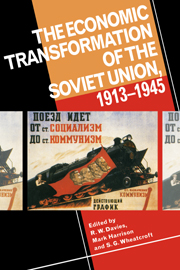Book contents
- Frontmatter
- Contents
- List of figures
- List of maps
- List of tables
- Notes on contributors
- Preface
- Acknowledgements
- Major events in Russian and Soviet economic development
- 1 Changing economic systems: an overview
- 2 The crooked mirror of Soviet economic statistics
- 3 National income
- 4 Population
- 5 Employment and industrial labour
- 6 Agriculture
- 7 Industry
- 8 Transport
- 9 Technology and the transformation of the Soviet economy
- 10 Foreign economic relations
- 11 The First World War and War Communism, 1914–1920
- 12 The Second World War
- Tables
- Glossary
- Notes
- Bibliography
- Index
11 - The First World War and War Communism, 1914–1920
Published online by Cambridge University Press: 05 June 2012
- Frontmatter
- Contents
- List of figures
- List of maps
- List of tables
- Notes on contributors
- Preface
- Acknowledgements
- Major events in Russian and Soviet economic development
- 1 Changing economic systems: an overview
- 2 The crooked mirror of Soviet economic statistics
- 3 National income
- 4 Population
- 5 Employment and industrial labour
- 6 Agriculture
- 7 Industry
- 8 Transport
- 9 Technology and the transformation of the Soviet economy
- 10 Foreign economic relations
- 11 The First World War and War Communism, 1914–1920
- 12 The Second World War
- Tables
- Glossary
- Notes
- Bibliography
- Index
Summary
When the Bolshevik revolution took place, Russia had already experienced more than three years of uninterrupted war. The revolution held out the hope of a more just and democratic society, in which differentials of wealth and income would be sharply curtailed. It offered the prospect of harnessing the talents and energies of the people to the task of socialist economic development. This task was made difficult, not only by Russia's economic backwardness, but also by the legacy of a war that had taken a heavy toll on ordinary people, sapping their morale and depleting the resources on which they depended. To make matters worse, no sooner had the revolution taken place than Russia became embroiled in a bitter civil war. In the towns, the supply of food and fuel deteriorated still further. Unemployment soared. With renewed war came fresh privations and upheaval. As the war intensified, workers found themselves subject to ever tighter supervision and discipline. In the countryside, the seizure and redistribution of land offered the peasantry a moment of celebration. It was short-lived. Desperate to obtain food for hungry workers and soldiers, the Bolsheviks resorted to coercive measures, culminating in a policy of nationwide grain requisition. As a result of this protracted period of upheaval, the men and women who tasted the fruits of liberation in 1917 quickly found that they turned to ashes in the mouth.
This chapter focuses on productive activities, whose behaviour has received much less attention than wartime economic administration and regulation.
- Type
- Chapter
- Information
- The Economic Transformation of the Soviet Union, 1913–1945 , pp. 216 - 237Publisher: Cambridge University PressPrint publication year: 1993
- 3
- Cited by



